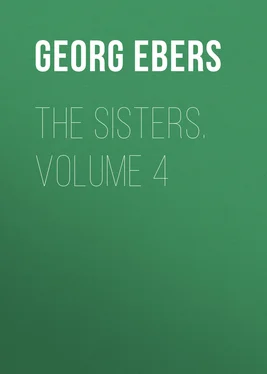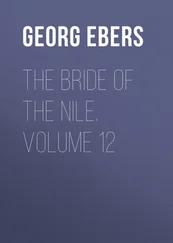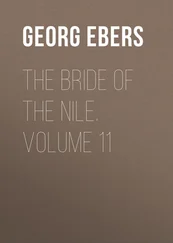Georg Ebers - The Sisters. Volume 4
Здесь есть возможность читать онлайн «Georg Ebers - The Sisters. Volume 4» — ознакомительный отрывок электронной книги совершенно бесплатно, а после прочтения отрывка купить полную версию. В некоторых случаях можно слушать аудио, скачать через торрент в формате fb2 и присутствует краткое содержание. Жанр: foreign_prose, literature_19, foreign_antique, на английском языке. Описание произведения, (предисловие) а так же отзывы посетителей доступны на портале библиотеки ЛибКат.
- Название:The Sisters. Volume 4
- Автор:
- Жанр:
- Год:неизвестен
- ISBN:нет данных
- Рейтинг книги:5 / 5. Голосов: 1
-
Избранное:Добавить в избранное
- Отзывы:
-
Ваша оценка:
- 100
- 1
- 2
- 3
- 4
- 5
The Sisters. Volume 4: краткое содержание, описание и аннотация
Предлагаем к чтению аннотацию, описание, краткое содержание или предисловие (зависит от того, что написал сам автор книги «The Sisters. Volume 4»). Если вы не нашли необходимую информацию о книге — напишите в комментариях, мы постараемся отыскать её.
The Sisters. Volume 4 — читать онлайн ознакомительный отрывок
Ниже представлен текст книги, разбитый по страницам. Система сохранения места последней прочитанной страницы, позволяет с удобством читать онлайн бесплатно книгу «The Sisters. Volume 4», без необходимости каждый раз заново искать на чём Вы остановились. Поставьте закладку, и сможете в любой момент перейти на страницу, на которой закончили чтение.
Интервал:
Закладка:
All this Klea learned from a messenger from the Egyptian temple in the Necropolis, who recognized her, and who was going to Memphis, commissioned by the priests of Osiris-Apis and Sokari to convey a petition to the king, praying that fresh troops might be promptly sent to replace those now withdrawn.
For some time she went on side by side with this messenger, but soon she found that she could not keep up with his hurried pace, and had to fall behind. In front of another tavern sat the officers of the troops, whose noisy mirth she had heard as she passed the former one; they were sitting over their wine and looking on at the dancing of two Egyptian girls, who screeched like cackling hens over their mad leaps, and who so effectually riveted the attention of the spectators, who were beating time for them by clapping their hands, that Klea, accelerating her step, was able to slip unobserved past the wild crew. All these scenes, nay everything she met with on the high-road, scared the girl who was accustomed to the silence and the solemn life of the temple of Serapis, and she therefore struck into a side path that probably also led to the city which she could already see lying before her with its pylons, its citadel and its houses, veiled in evening mist. In a quarter of an hour at most she would have crossed the desert, and reach the fertile meadow land, whose emerald hue grew darker and darker every moment. The sun was already sinking to rest behind the Libyan range, and soon after, for twilight is short in Egypt, she was wrapped in the darkness of night. The westwind, which had begun to blow even at noon, now rose higher, and seemed to pursue her with its hot breath and the clouds of sand it carried with it from the desert.
She must certainly be approaching water, for she heard the deep pipe of the bittern in the reeds, and fancied she breathed a moister air. A few steps more, and her foot sank in mud; and she now perceived that she was standing on the edge of a wide ditch in which tall papyrus-plants were growing. The side path she had struck into ended at this plantation, and there was nothing to be done but to turn about, and to continue her walk against the wind and with the sand blowing in her face.
The light from the drinking-booth showed her the direction she must follow, for though the moon was up, it is true, black clouds swept across it, covering it and the smaller lights of heaven for many minutes at a time. Still she felt no fatigue, but the shouts of the men and the loud cries of the women that rang out from the tavern filled her with alarm and disgust. She made a wide circuit round the hostelry, wading through the sand hillocks and tearing her dress on the thorns and thistles that had boldly struck deep root in the desert, and had grown up there like the squalid brats in the hovel of a beggar. But still, as she hurried on by the high-road, the hideous laughter and the crowing mirth of the dancing-girls still rang in her mind's ear.
Her blood coursed more swiftly through her veins, her head was on fire, she saw Irene close before her, tangibly distinct—with flowing hair and fluttering garments, whirling in a wild dance like a Moenad at a Dionysiac festival, flying from one embrace to another and shouting and shrieking in unbridled folly like the wretched girls she had seen on her way. She was seized with terror for her sister—an unbounded dread such as she had never felt before, and as the wind was now once more behind her she let herself be driven on by it, lifting her feet in a swift run and flying, as if pursued by the Erinnyes, without once looking round her and wholly forgetful of the smith's commission, on towards the city along the road planted with trees, which as she knew led to the gate of the citadel.
CHAPTER XVIII
In front of the gate of the king's palace sat a crowd of petitioners who were accustomed to stay here from early dawn till late at night, until they were called into the palace to receive the answer to the petition they had drawn up. When Klea reached the end of her journey she was so exhausted and bewildered that she felt the imperative necessity of seeking rest and quiet reflection, so she seated herself among these people, next to a woman from Upper Egypt. But hardly had she taken her place by her with a silent greeting, when her talkative neighbor began to relate with particular minuteness why she had come to Memphis, and how certain unjust judges had conspired with her bad husband to trick her— for men were always ready to join against a woman—and to deprive her of everything which had been secured to her and her children by her marriage-contract. For two months now, she said, she had been waiting early and late before the sublime gate, and was consuming her last ready cash in the city where living was so dear; but it was all one to her, and at a pinch she would sell even her gold ornaments, for sooner or later her cause must come before the king, and then the wicked villain and his accomplices would be taught what was just.
Klea heard but little of this harangue; a feeling had come over her like that of a person who is having water poured again and again on the top of his head. Presently her neighbor observed that the new-comer was not listening at all to her complainings; she slapped her shoulder with her hand, and said:
"You seem to think of nothing but your own concerns; and I dare say they are not of such a nature as that you should relate them to any one else; so far as mine are concerned the more they are discussed, the better."
The tone in which these remarks were made was so dry, and at the same time so sharp, that it hurt Klea, and she rose hastily to go closer to the gate. Her neighbor threw a cross word after her; but she did not heed it, and drawing her veil closer over her face, she went through the gate of the palace into a vast courtyard, brightly lighted up by cressets and torches, and crowded with foot-soldiers and mounted guards.
The sentry at the gate perhaps had not observed her, or perhaps had let her pass unchallenged from her dignified and erect gait, and the numerous armed men through whom she now made her way seemed to be so much occupied with their own affairs, that no one bestowed any notice on her. In a narrow alley, which led to a second court and was lighted by lanterns, one of the body-guard known as Philobasilistes, a haughty young fellow in yellow riding-boots and a shirt of mail over his red tunic, came riding towards her on his tall horse, and noticing her he tried to squeeze her between his charger and the wall, and put out his hand to raise her veil; but Klea slipped aside, and put up her hands to protect herself from the horse's head which was almost touching her.
The cavalier, enjoying her alarm, called out: "Only stand still—he is not vicious."
"Which, you or your horse?" asked Klea, with such a solemn tone in her deep voice that for an instant the young guardsman lost his self- possession, and this gave her time to go farther from the horse. But the girl's sharp retort had annoyed the conceited young fellow, and not having time to follow her himself, he called out in a tone of encouragement to a party of mercenaries from Cyprus, whom the frightened girl was trying to pass:
"Look under this girl's veil, comrades, and if she is as pretty as she is well-grown, I wish you joy of your prize." He laughed as he pressed his knees against the flanks of his bay and trotted slowly away, while the Cypriotes gave Klea ample time to reach the second court, which was more brightly lighted even than the first, that they might there surround her with insolent importunity.
The helpless and persecuted girl felt the blood run cold in her veins, and for a few minutes she could see nothing but a bewildering confusion of flashing eyes and weapons, of beards and hands, could hear nothing but words and sounds, of which she understood and felt only that they were revolting and horrible, and threatened her with death and ruin. She had crossed her arms over her bosom, but now she raised her hands to hide her face, for she felt a strong hand snatch away the veil that covered her head. This insolent proceeding turned her numb horror to indignant rage, and, fixing her sparkling eyes on her bearded opponents, she exclaimed:
Читать дальшеИнтервал:
Закладка:
Похожие книги на «The Sisters. Volume 4»
Представляем Вашему вниманию похожие книги на «The Sisters. Volume 4» списком для выбора. Мы отобрали схожую по названию и смыслу литературу в надежде предоставить читателям больше вариантов отыскать новые, интересные, ещё непрочитанные произведения.
Обсуждение, отзывы о книге «The Sisters. Volume 4» и просто собственные мнения читателей. Оставьте ваши комментарии, напишите, что Вы думаете о произведении, его смысле или главных героях. Укажите что конкретно понравилось, а что нет, и почему Вы так считаете.












